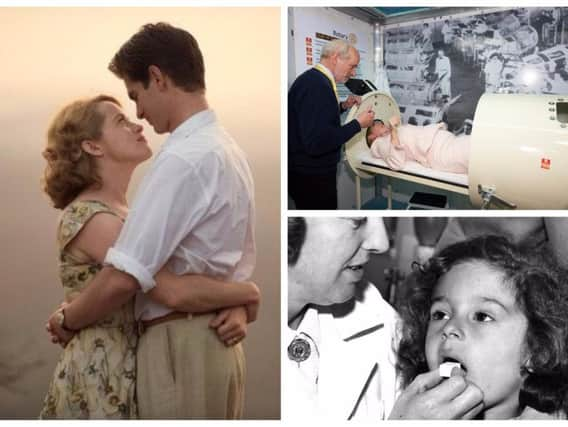'The war against polio has not yet been won'


Polio is a highly contagious disease that affects the nervous system, causing sickness, vomiting, dizziness and, in its most severe cases, paralysis of the respiratory system and death. Young children under the age of five are most vulnerable.
This year only 12 cases of wild polio virus have been diagnosed worldwide, in Pakistan and Afghanistan with a further 61 vaccine-related cases in Syria and Congo. That compares with the 350,000 annually that were diagnosed when Rotary International launched its campaign to eradicate polio in 1985.
Advertisement
Hide AdAdvertisement
Hide AdThe latest case of polio was reported in Pakistan on August 21 – nine weeks ago. Is it possible that it could be the last case of polio in the world? If it is, the immunisation campaign must continue for a further three years or polio will return. While ever one child is diagnosed the world continues to live under the cloud of an outbreak, yet we are so close to eradicating polio from the world.
Prevention is simple. There is a very effective vaccination that every child in the UK has within months of being born. It gives their families, and them, a lifetime free from the risk of the deadly disease.
In many countries in Asia and Africa, this is not the case. In these countries there is only a 30 per cent chance a child will be immunised; Afghanistan launched its own immunisation programme only at the end of last year, while Pakistan doesn’t have an effective programme.
In these remote and often hostile environments, children rely on donations from organisations including Rotary International. Using money donated by Rotarians worldwide, their teams of volunteers work in partnership with local health workers to identify at risk children and keep them safe.
Advertisement
Hide AdAdvertisement
Hide AdThe toll plaza in Rohat, Pakistan, is typical of how lives are saved. Here, Rotary International teams arrive in high-vis blue vests protected by military forces. They often have just seconds to identify children on the move and give them a simple two-drop oral vaccine and a purple pinkie ID to show they are protected.
Locations like these have a very fluid population with people moving constantly between Afghanistan and Pakistan, making basic health care difficult and preventative care almost impossible. In environments such as these, the risk of infection and contagion is constant and health workers and volunteer medics are themselves at risk. In addition, there is the ever-present risk of terror.
Rotarians move around locations such as these carrying chiller boxes full of the life-saving vaccine ready to set up a vaccination post at a moment’s notice, wherever and whenever there is the chance to save a life. Teams of health workers verify that every child passing through the toll has been immunised.
Sadly, just one outbreak risks the lives of many more children who could be infected. In Pakistan, where most of the world’s polio cases are registered, the task of immunisation is more complex. A constantly itinerant and, largely uneducated population provide moving targets that are as difficult to pin down as the disease itself. It demands an immunisation strategy as agile and stubborn as polio.
Advertisement
Hide AdAdvertisement
Hide AdIn Rotary International it has met its match. Since launching its campaign to eradicate polio, Rotary International has raised millions of pounds directly and through partnerships such as that with the Bill and Melinda Gates Foundation, to immunise millions of children most at risk.
Working with Unicef, it has been able to send volunteer Rotarians, many of whom are dedicated medics in their home countries, to ensure the vaccines reach those most at risk.
Rotarians working in this way, and on any other project, give their own time and pay their own way. Every pound donated to Rotary International for any of the causes we support goes directly to that organisation. Polio remains our local, regional, national and international focus. In Yorkshire this year Rotarians have raised in excess of £100,000 for the polio eradication fund.
Children in the UK have access to one of the most effective, robust and cheapest healthcare systems in the world. Not every child is that lucky. Yet the infection of one is a risk to all of us.
Advertisement
Hide AdAdvertisement
Hide AdToday, Bradford City Council is lighting up City Hall, Margaret MacMillan Tower and the arches under Forster Square Railway Station purple as a reminder of World Polio Day. Tomorrow, don’t forget the threat remains.
Robert Morphet is district governor of Rotary Great Britain & Ireland.